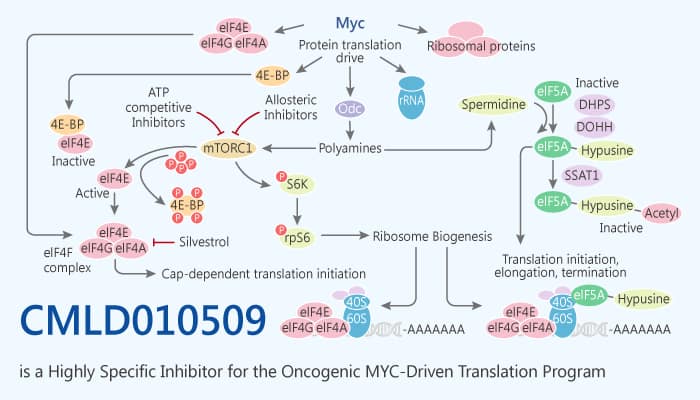Multiple myelomas (MM) is a hematological malignancy, it exhibits a clonal proliferation of plasma cells in the bone marrow micro-environment. MM remains a frequently incurable hematological malignancy until today.
MYC can directly enhance transcription genes encoding ribosomal proteins, ribosomal RNA, and proteins of the translation initiation complex. Furthermore, most MM patients have diagnosed with MM harbor MYC activation.
Today, we will introduce a small-molecule for anti-MM activity, CMLD010509. this small-molecular is a Rocaglate natural product.

Firstly, in a SAR study, CMLD010509 shows strong inhibitory activities on most MM cell lines (mean IC50=10 nM). However, it is less effective against lung and breast cancer cell lines, with an IC50 of ~30 nM.
In an RNA sequencing (RNA-seq) study, CMLD010509 significantly decreases HSP70 and HSP90 mRNA, at the same time, it down-regulates the HSF1 program in CMLD010509-treated cells by pathway analysis.
Nextly, in NCI-H929 and MM1S cell, kinetic studies reveals a rapid apoptotic response to CMLD010509. This compound increases caspase-3 and caspase-7 activation. It also associates with the depletion of MYC and MCL-1 even at low concentrations (10 nM). Additionally, CMLD010509 is against human peripheral blood mononuclear cells (PBMCs) activity with no cytotoxicity. This suggests that the potential for a useful therapeutic window for this agent against MM.
Lastly, In order to access the drug is effective and tolerable in vivo. In severe SCID mice with luciferase (Luc)-MM cells, CMLD010509 (0.7 mg/kg ) causes a marked reduction in tumor burden despite the very rapid growth of his aggressive MM cell line. Notably, as the bodyweight and normal complete blood count presentation show, CMLD010509 treatment is well tolerated.
To confirm the in vivo efficacy of CMDL010509, in SCID mice with KMS-11 cells. CMLD010509 treatment starts from week 4 until sacrifice at week 8. In IHC staining, CMLD010509 shows decreases in CD138+ plasma cells counts and depletion of MYC. This further validates the activity of CMLD010509 on MM cell lines in vivo.
In summary, CMLD010509 is a highly specific inhibitor of the oncogenic translation program, it supporting multiple myeloma (MM)-including key oncoproteins such as MYC, MDM2, CCND1, MAF, and MCL-1. It a promising compound for MM treatment.
reference:
Manier S, et al. Sci Transl Med. 2017 May 10;9(389). pii: eaal2668.